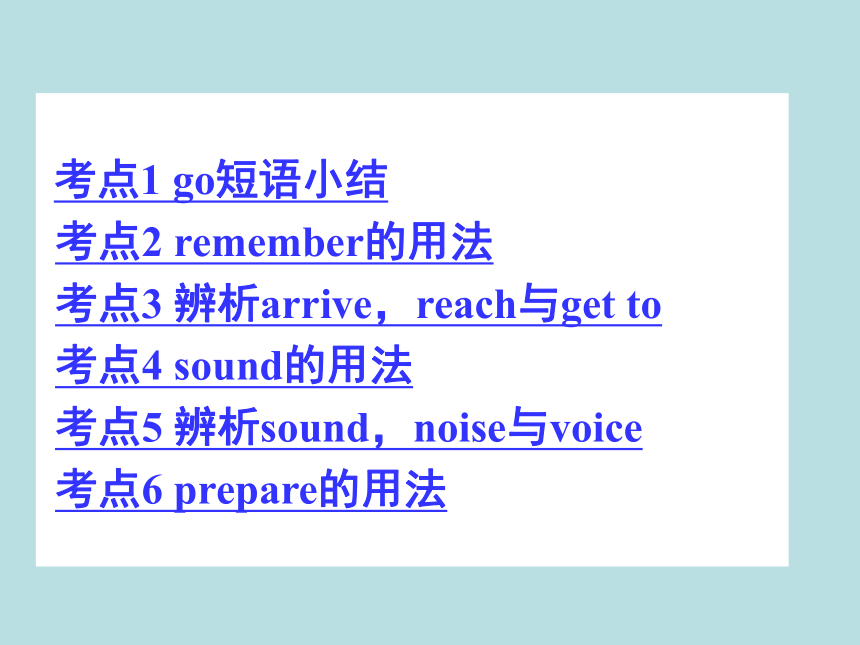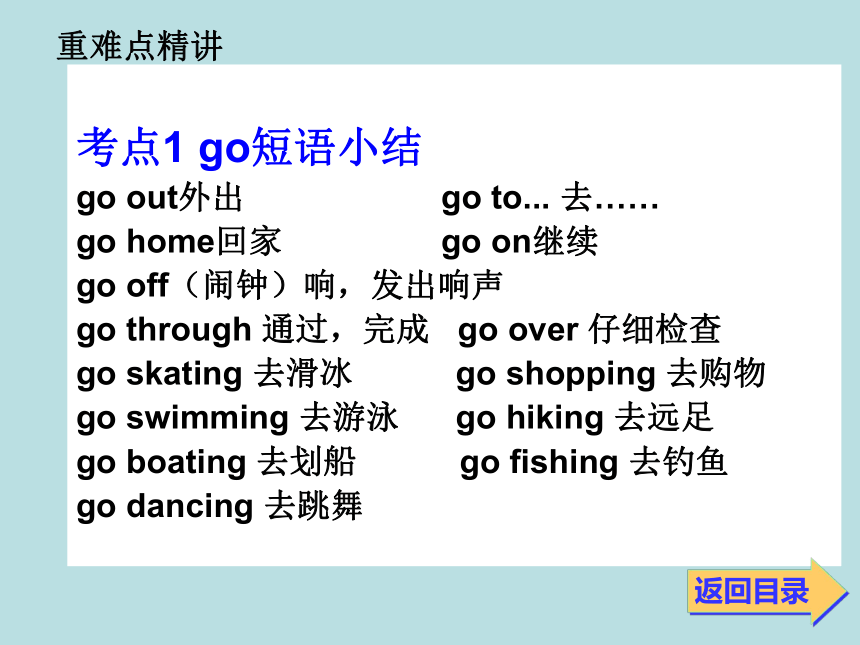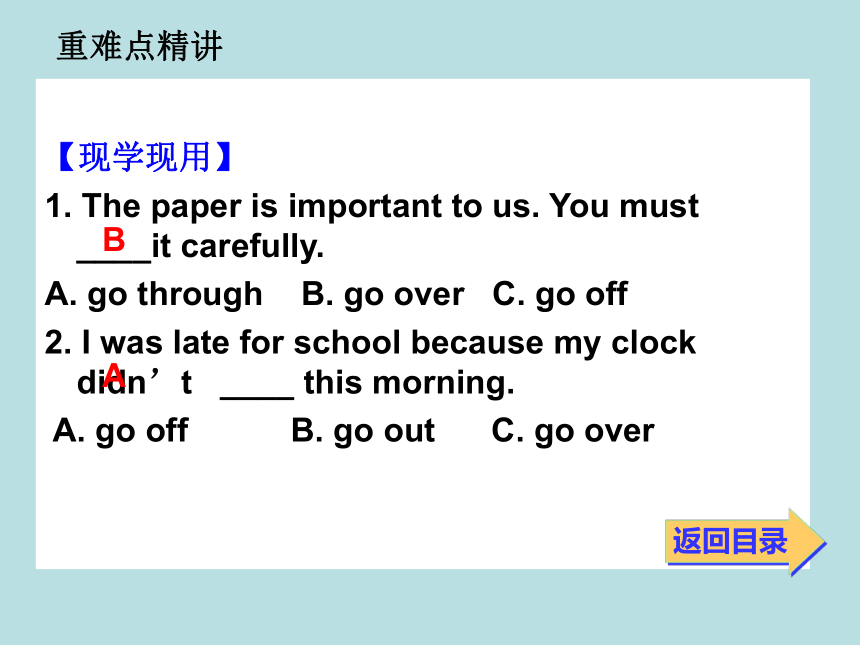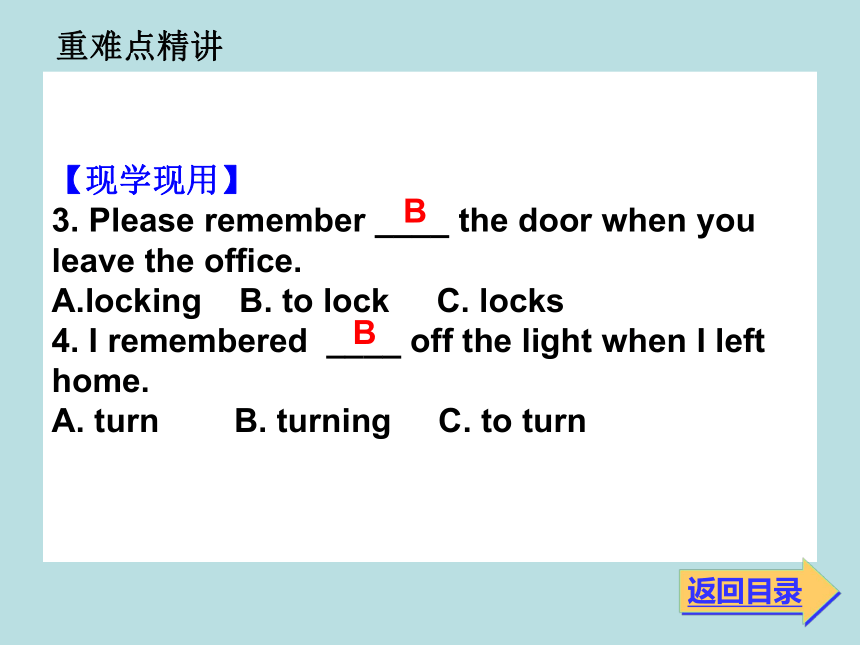【中考考点清单】2014年中考英语(湖南专用 新课标)总复习课件:第一部分 教材知识梳理 七年级(下)Unit 8(含中考试题示例)
文档属性
| 名称 | 【中考考点清单】2014年中考英语(湖南专用 新课标)总复习课件:第一部分 教材知识梳理 七年级(下)Unit 8(含中考试题示例) |  | |
| 格式 | zip | ||
| 文件大小 | 1.2MB | ||
| 资源类型 | 教案 | ||
| 版本资源 | 通用版 | ||
| 科目 | 英语 | ||
| 更新时间 | 2014-01-21 19:39:21 | ||
图片预览







文档简介
课件18张PPT。
重难点精讲
七年级(下)Unit 8
考点1 go短语小结
考点2 remember的用法
考点3 辨析arrive,reach与get to
考点4 sound的用法
考点5 辨析sound,noise与voice
考点6 prepare的用法
考点1 go短语小结
go out外出 go to... 去……
go home回家 go on继续
go off(闹钟)响,发出响声
go through 通过,完成 go over 仔细检查
go skating 去滑冰 go shopping 去购物
go swimming 去游泳 go hiking 去远足
go boating 去划船 go fishing 去钓鱼
go dancing 去跳舞 重难点精讲返回目录
【现学现用】
1. The paper is important to us. You must ____it carefully.
A. go through B. go over C. go off
2. I was late for school because my clock didn’t ____ this morning.
A. go off B. go out C. go over返回目录重难点精讲BA
重难点精讲返回目录考点2 remember的用法
◆remember to do sth. “记住要去做某事(未做)”。
如:
Please remember to come tomorrow.
请记住明天。
◆remember doing sth. “记住做过某事(已做)”。
如:
He didn’t remember buying such a thing until he saw the receipt. 直到看到收据他才记起买过这样一个东西
【现学现用】
3. Please remember ____ the door when you
leave the office.
A.locking B. to lock C. locks
4. I remembered ____ off the light when I left
home.
A. turn B. turning C. to turn
重难点精讲返回目录BB考点3 辨析arrive,reach与get to
三者都有“到达”之意。
◆arrive at+小地方,arrive in+大地方,副词前省
略介词at或in。如:
When did she arrive here last time?
她上次是什么时候到这儿的?
When did your parents arrive in Shanghai?
你父母何时到上海的?
注意:没有表地点的宾语时,只能用arrive。若跟
here, there, home等副词时,arrive后不加介词。
如:返回目录重难点精讲
When did they arrive home yesterday?
他们昨天什么时候到家的?
◆get to后加地点名词,若跟地点副词时,去掉to。 如:
Lucy got to the zoo before 8 o’clock.
露西八点前到了动物园。
It was late when I got home. 我到家时天色已晚。
◆reach是及物动词,后直接跟宾语。如:
They reached London on Friday.
他们星期五到达了伦敦。返回目录重难点精讲 返回目录重难点精讲 返回目录重难点精讲
【现学现用】
5. It was late when I ____ home.
A. arrive at B. got C. reached in
6. I visited many places including the History Museum last Saturday. When I ____ at the hotel, it was very late.
A.got B. reached C. arrived
BC考点4 sound的用法
◆sound作系动词时,后跟形容词作表语。如
The song sounds beautiful. 这首歌听起来很优美。
【知识拓展】
类似的系动词还有look(看起来),seem(似
乎),taste(尝起来),feel(摸起来),turn(变
得),become(变成)。如:
He looks happy. 他看起来很高兴。
He seems quite happy. 他似乎很高兴。返回目录重难点精讲
It tastes fine. 这东西尝起来不错。
The cloth feels soft. 这布料摸起来柔软。
His face turns red. 他的脸变红了。
It grew dark. 天色变暗了。
◆sound 除了作系动词外,还可以作及物动词,意为“使发声,使响,发出(某个声音)”。如:
Sound your horn to warn the other drivers. 按喇
叭,提醒其他司机。
返回目录重难点精讲◆sound还可以作不及物动词,意为“响,发声”。如:
The bell sounds at 8:00 a.m. 上午8点闹铃响了。
◆sound还可以作名词,表示“声音”,指任何能听到的声音。如:
Sound travels fast. 声音传播得快。
【现学现用】
7. Your idea ____ good, but I have no time.
A.sounds B.hears C.listens
8. The music made me think of the ____ of a running stream.
A.shout B.noise C.sound
重难点精讲返回目录AC考点5 辨析sound,noise与voice
◆sound则泛指所有声音。如:
Light travels faster than sound. 光速比声速快。
◆noise指“噪音”,即令人不愉快的声音、嘈杂声。如:
Don’t make any noise in the reading room. 不要
在阅览室喧哗。
◆voice主要指人的说话声、唱歌声。如:
She has a sweet voice. 她的声音很甜美。重难点精讲返回目录重难点精讲返回目录
【现学现用】
9. My little sister has a sweet____.
A. voice B. sound C. noise
10. I really can’t stand the ____ outside
because I always can’t fall asleep every
evening.
A. noise B. voice C. sound 重难点精讲返回目录AA考点6 prepare的用法
◆prepare用作及物动词时,后接名词或者代词作宾语/动词不定式,意为“准备……/准备做某事”。如:
Our English teacher was preparing the lessons
when I came into the office. 我去办公室时,我们
的英语老师正在备课。
◆prepare用作不及物动词时,常和介词for连用,意为“为……做准备”。如:
The students are busy preparing for the final
exam. 学生们正在忙着准备期末考试。重难点精讲返回目录
【现学现用】
11. They were preparing ____ the river when it
began to rain.
A. cross B. to cross C. crossing
12. Hope for the best and prepare____the
worst.
A. to B. for C. with重难点精讲返回目录BB
重难点精讲
七年级(下)Unit 8
考点1 go短语小结
考点2 remember的用法
考点3 辨析arrive,reach与get to
考点4 sound的用法
考点5 辨析sound,noise与voice
考点6 prepare的用法
考点1 go短语小结
go out外出 go to... 去……
go home回家 go on继续
go off(闹钟)响,发出响声
go through 通过,完成 go over 仔细检查
go skating 去滑冰 go shopping 去购物
go swimming 去游泳 go hiking 去远足
go boating 去划船 go fishing 去钓鱼
go dancing 去跳舞 重难点精讲返回目录
【现学现用】
1. The paper is important to us. You must ____it carefully.
A. go through B. go over C. go off
2. I was late for school because my clock didn’t ____ this morning.
A. go off B. go out C. go over返回目录重难点精讲BA
重难点精讲返回目录考点2 remember的用法
◆remember to do sth. “记住要去做某事(未做)”。
如:
Please remember to come tomorrow.
请记住明天。
◆remember doing sth. “记住做过某事(已做)”。
如:
He didn’t remember buying such a thing until he saw the receipt. 直到看到收据他才记起买过这样一个东西
【现学现用】
3. Please remember ____ the door when you
leave the office.
A.locking B. to lock C. locks
4. I remembered ____ off the light when I left
home.
A. turn B. turning C. to turn
重难点精讲返回目录BB考点3 辨析arrive,reach与get to
三者都有“到达”之意。
◆arrive at+小地方,arrive in+大地方,副词前省
略介词at或in。如:
When did she arrive here last time?
她上次是什么时候到这儿的?
When did your parents arrive in Shanghai?
你父母何时到上海的?
注意:没有表地点的宾语时,只能用arrive。若跟
here, there, home等副词时,arrive后不加介词。
如:返回目录重难点精讲
When did they arrive home yesterday?
他们昨天什么时候到家的?
◆get to后加地点名词,若跟地点副词时,去掉to。 如:
Lucy got to the zoo before 8 o’clock.
露西八点前到了动物园。
It was late when I got home. 我到家时天色已晚。
◆reach是及物动词,后直接跟宾语。如:
They reached London on Friday.
他们星期五到达了伦敦。返回目录重难点精讲 返回目录重难点精讲 返回目录重难点精讲
【现学现用】
5. It was late when I ____ home.
A. arrive at B. got C. reached in
6. I visited many places including the History Museum last Saturday. When I ____ at the hotel, it was very late.
A.got B. reached C. arrived
BC考点4 sound的用法
◆sound作系动词时,后跟形容词作表语。如
The song sounds beautiful. 这首歌听起来很优美。
【知识拓展】
类似的系动词还有look(看起来),seem(似
乎),taste(尝起来),feel(摸起来),turn(变
得),become(变成)。如:
He looks happy. 他看起来很高兴。
He seems quite happy. 他似乎很高兴。返回目录重难点精讲
It tastes fine. 这东西尝起来不错。
The cloth feels soft. 这布料摸起来柔软。
His face turns red. 他的脸变红了。
It grew dark. 天色变暗了。
◆sound 除了作系动词外,还可以作及物动词,意为“使发声,使响,发出(某个声音)”。如:
Sound your horn to warn the other drivers. 按喇
叭,提醒其他司机。
返回目录重难点精讲◆sound还可以作不及物动词,意为“响,发声”。如:
The bell sounds at 8:00 a.m. 上午8点闹铃响了。
◆sound还可以作名词,表示“声音”,指任何能听到的声音。如:
Sound travels fast. 声音传播得快。
【现学现用】
7. Your idea ____ good, but I have no time.
A.sounds B.hears C.listens
8. The music made me think of the ____ of a running stream.
A.shout B.noise C.sound
重难点精讲返回目录AC考点5 辨析sound,noise与voice
◆sound则泛指所有声音。如:
Light travels faster than sound. 光速比声速快。
◆noise指“噪音”,即令人不愉快的声音、嘈杂声。如:
Don’t make any noise in the reading room. 不要
在阅览室喧哗。
◆voice主要指人的说话声、唱歌声。如:
She has a sweet voice. 她的声音很甜美。重难点精讲返回目录重难点精讲返回目录
【现学现用】
9. My little sister has a sweet____.
A. voice B. sound C. noise
10. I really can’t stand the ____ outside
because I always can’t fall asleep every
evening.
A. noise B. voice C. sound 重难点精讲返回目录AA考点6 prepare的用法
◆prepare用作及物动词时,后接名词或者代词作宾语/动词不定式,意为“准备……/准备做某事”。如:
Our English teacher was preparing the lessons
when I came into the office. 我去办公室时,我们
的英语老师正在备课。
◆prepare用作不及物动词时,常和介词for连用,意为“为……做准备”。如:
The students are busy preparing for the final
exam. 学生们正在忙着准备期末考试。重难点精讲返回目录
【现学现用】
11. They were preparing ____ the river when it
began to rain.
A. cross B. to cross C. crossing
12. Hope for the best and prepare____the
worst.
A. to B. for C. with重难点精讲返回目录BB
